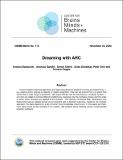| dc.contributor.author | Banburski, Andrzej | |
| dc.contributor.author | Ghandi, Anshula | |
| dc.contributor.author | Alford, Simon | |
| dc.contributor.author | Dandekar, Sylee | |
| dc.contributor.author | Chin, Peter | |
| dc.contributor.author | Poggio, Tomaso | |
| dc.date.accessioned | 2020-11-23T18:47:33Z | |
| dc.date.available | 2020-11-23T18:47:33Z | |
| dc.date.issued | 2020-11-23 | |
| dc.identifier.uri | https://hdl.handle.net/1721.1/128607 | |
| dc.description.abstract | Current machine learning algorithms are highly specialized to whatever it is they are meant to do –– e.g. playing chess, picking up objects, or object recognition. How can we extend this to a system that could solve a wide range of problems? We argue that this can be achieved by a modular system –– one that can adapt to solving different problems by changing only the modules chosen and the order in which those modules are applied to the problem. The recently introduced ARC (Abstraction and Reasoning Corpus) dataset serves as an excellent test of abstract reasoning. Suited to the modular approach, the tasks depend on a set of human Core Knowledge inbuilt priors. In this paper we implement these priors as the modules of our system. We combine these modules using a neural-guided program synthesis. | en_US |
| dc.description.sponsorship | This material is based upon work supported by the Center for Brains, Minds and Machines (CBMM), funded by NSF STC award CCF-1231216. | en_US |
| dc.language.iso | en_US | en_US |
| dc.publisher | Center for Brains, Minds and Machines (CBMM) | en_US |
| dc.relation.ispartofseries | CBMM Memo;113 | |
| dc.title | Dreaming with ARC | en_US |
| dc.type | Technical Report | en_US |
| dc.type | Working Paper | en_US |
| dc.type | Other | en_US |
